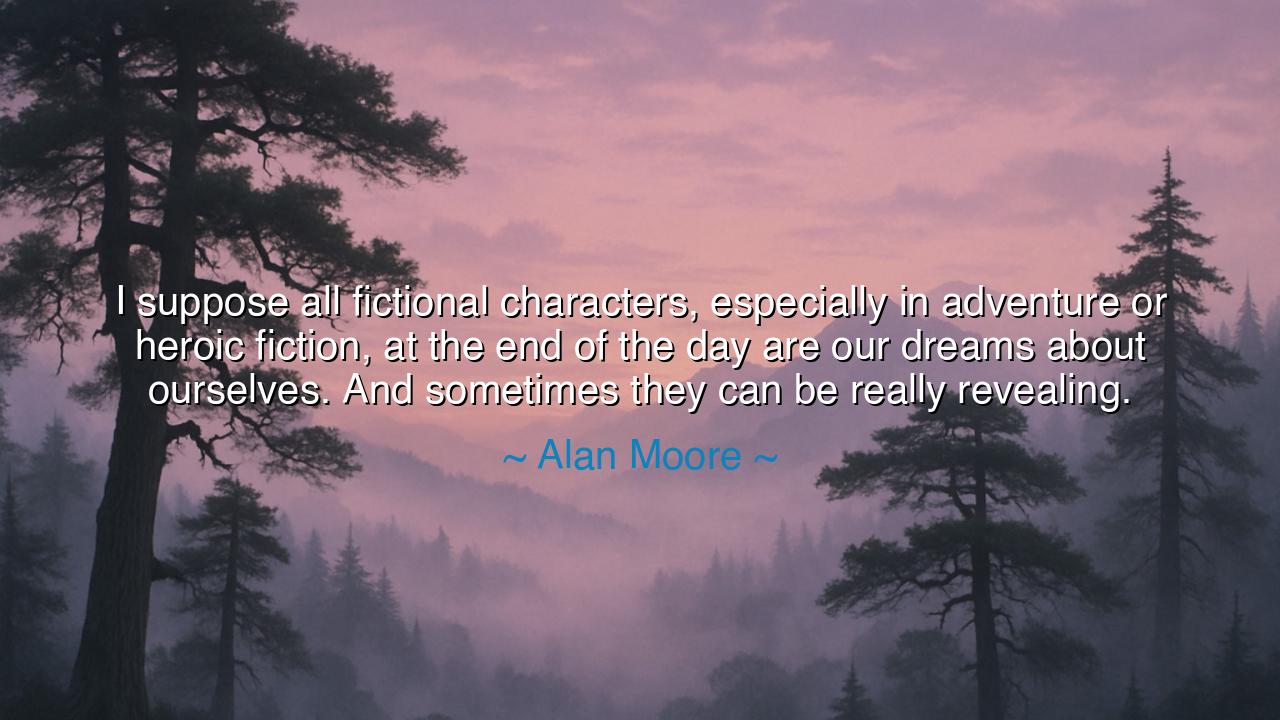
I suppose all fictional characters, especially in adventure or
I suppose all fictional characters, especially in adventure or heroic fiction, at the end of the day are our dreams about ourselves. And sometimes they can be really revealing.






In the thought-provoking words of Alan Moore, "I suppose all fictional characters, especially in adventure or heroic fiction, at the end of the day are our dreams about ourselves. And sometimes they can be really revealing." These words speak to the very core of what it means to create and to imagine. The heroes and adventurers that we find in stories are not mere products of fantasy—they are reflections of the deepest desires, fears, and aspirations that reside within us. Through the lens of fiction, we project our own dreams and struggles onto these characters, and in doing so, we often uncover truths about ourselves that we might otherwise overlook.
Moore’s words suggest that fictional characters are not just products of imagination, but symbols of the human condition. In the realms of adventure and heroic fiction, the characters we gravitate toward often embody traits that we wish to see in ourselves: bravery, wisdom, and virtue. Yet, they are also a reflection of our own flaws, struggles, and inner conflicts. Consider, for example, the ancient tales of Hercules, the mighty hero of Greek mythology. While Hercules is celebrated for his strength and heroism, his story is also filled with moments of doubt, rage, and suffering. His twelve labors represent not just external challenges, but an inner battle with his own limitations and darker instincts. In this way, Hercules is not just a mythical figure; he is a reflection of human resilience in the face of personal turmoil, a reminder that even the greatest of heroes are shaped by their inner struggles.
In more recent times, we can look to the figure of Batman. The Dark Knight, with his brooding nature and relentless pursuit of justice, is a symbol of the internal battle between good and evil that resides within every person. The character of Batman is often portrayed as a man shaped by trauma and loss, yet driven by a deep desire to protect others. This duality—the hero’s strength and vulnerability—speaks to a truth about the human condition: we are all at once capable of great good and darkness, and it is in our ability to confront both sides that we find true strength. The dream of a hero like Batman reflects our own desires to transcend our weaknesses, to find justice in a chaotic world, and to rise above the forces that seek to destroy us.
What Moore reveals in his statement is that the characters we create in fiction are not merely for our entertainment, but serve as a mirror to our own lives. They allow us to confront the aspects of ourselves we may wish to deny—the darkness, the fear, the vulnerability—while simultaneously providing us with the opportunity to embrace the heroic within. Fictional characters, especially in their most heroic forms, represent the dreams we carry within us of what we could be, what we should be, and what we aspire to become. These dreams, though fantastical, often have profound significance in how we navigate the challenges of our own lives.
The Greek philosophers understood the power of myth and fiction to reflect the human psyche. For Plato, the myths of the gods were not mere stories but allegories for understanding human nature. In his work The Republic, Plato used the myth of the cave to illustrate the journey of enlightenment, the transition from ignorance to knowledge. Similarly, the stories we tell through fiction can guide us on our own path of self-discovery, showing us not only who we are but who we might become if we dare to confront our inner darkness and embrace our potential for good. The journey of the hero is not just a physical one but an internal transformation, where each challenge faced is a step toward understanding and embracing our true selves.
In the same way, modern storytelling—whether through books, movies, or graphic novels—invites us to ask ourselves: what part of us is represented in the heroes we admire, and what part in the villains we fear? Take, for instance, Harry Potter, a young boy who discovers he is destined for greatness, but who must first confront his own doubts and insecurities. The lessons Harry learns—about friendship, courage, sacrifice, and the choices that define us—are not just lessons for him but for us, the readers and viewers. In Harry, we see our own potential for greatness, tempered by the knowledge that it is not our destiny but our choices that determine who we become.
Thus, the lesson we can draw from Moore’s quote is this: we must not only dream of what we could be but also recognize the deeper truths that lie beneath those dreams. Fiction is not an escape from the world but a mirror that reflects our deepest desires and hidden fears. By examining the heroes we admire and the characters we create, we can gain insight into the parts of ourselves that we may not fully understand. As we move through life, let us remember that our dreams—whether in fiction or reality—are not distant fantasies, but blueprints for the heroic potential that lies within each of us. The journey to greatness is not about perfection, but about embracing both the light and darkness within, and choosing, each day, to rise above and strive for something greater.






AAdministratorAdministrator
Welcome, honored guests. Please leave a comment, we will respond soon